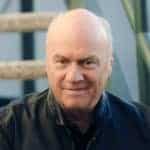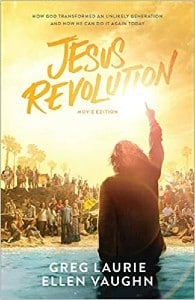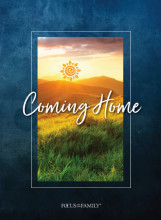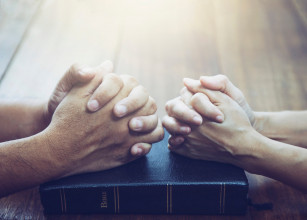Preview:
Greg Laurie: You know, Jesus loved to tell stories, and people like to hear stories of other people. We like stories where someone rises out of the ashes like the phoenix and somehow, things turn out better in the end, but most of our lives don’t really work that way. There are highs and lows, and there are ups and downs.
End of Preview
John Fuller: Well, that’s a perfect set up for what we have for you today on Focus on the Family. We’re gonna hear one of those stories with all the twists and turns that are common to this life. Your host is Focus president, Jim Daly, and I’m John Fuller.
Jim Daly: John, our guest is Greg Laurie, and he’s going to share a fascinating testimony today and next time, and let me just say if you’re having a hard time dealing with a difficult childhood, man, I understand. I’ve been there. Uh, stay with us because Greg’s story is going to illustrate the fact that God can help you overcome any type of upbringing, and I tell you what, this is a message of hope, not despair.
John: It really is, and, uh, here’s Greg Laurie speaking at Harvest Christian Fellowship in Riverside, California on today’s episode of Focus on the Family.
Greg: I was born in the ’50s, and I have to tell you, that was kind of a cool time to be alive. Elvis was king before he got fat.
Audience: (laughter)
Greg: James Dean was a movie star, Kennedy, John Kennedy was still a senator, Ike was the president.
You could buy a handful of candy for a penny, and for $.25, you could get yourself a killer burger with all of the trimmings. And we would watch shows like Father Knows Best, and Leave it to Beaver, and I Love Lucy, and not having a father around, I kind of looked to those television fathers for wisdom.
I would listen very carefully to what Beaver’s dad would tell him when he took him in to the den, you know, gave him a little lecture, or what the dad on the Father Knows Best show would say, but there was to be trouble in paradise.
My mom, Charlene McDaniel, was a Marilyn Monroe look alike, and men beat a quick path to her, and she ended up getting married seven different times, and five of those men ended up being my stepfathers.
It was the early ’50s. Long Beach, California was filled with sailors, and Charlene had no problem attracting them with her platinum blonde hair and come hither look. And, uh, one day, a particular sailor who was, uh, originally from Canada.
He was supposedly good on the dance floor, had strawberry blonde hair. He and Charlene had some fun, apparently fell into bed that night, and a child was conceived, and my mom ultimately decided to name that child Gregory.
This child was conceived out of wedlock. This child was me. So I was illegitimate, and I have to tell you something, when you find out you’re illegitimate, that you weren’t planned, that’s kind of disconcerting because you ask yourself the question, “Was I even meant to be? Was I a mistake? Is my life an accident, or does God have a plan for me, despite my rather inauspicious beginnings?”
My mom was in full party mode at this point in her life, and her beauty was at full wattage, and what I remember most about my childhood is always having to say goodbye to my mother, ’cause she was always leaving.
I just couldn’t understand why she didn’t ever want to be around me, and I just think my mom was thinking about finding her own personal happiness, and chasing her own dreams, and so I got passed around a lot.
I lived with an aunt here, and I lived with my grandparents quite a bit. My grandparents, Stella and Charles McDaniel were from Friendship, Arkansas. My grandfather, he was a harsh disciplinarian. You did not want to cross him because you knew when you did, you were gonna pay a dear price.
My grandmother wasn’t really big on giving a lot of hugs, but boy, she really knew how to cook comfort food. And then my mom decided that I should spend some time with her, and I’d spend a little time with her. Then I’d go back to my grandmother’s house again.
Then she put me in military school two times in my life, and I can tell you honestly, I didn’t like that one bit. And I would spend time with my mom, and when she was in party mode, it was pretty scary. She would usually come home late at night, it would be 2:00 or 3:00 in the morning.
There would be a little talking, a few more drinks, some loud arguing, some things crashing, fighting starting, and it would always escalate, and then that pretty much was my normal childhood that I grew up with for my early years.
My mom always seemed to draw the wrong kind of guys, guys who smoked, and cussed, and reeked of bad cologne and guys who drove fancy sports cars, and talked big. She always drew these guys to herself, and I remember not really liking any of them, guys that would tell me to disappear so they could spend some time with my mom.
And I have to tell you, I saw things a child should never see, and I won’t tell you what those things were, but there were things no child should be exposed to. But I learned how to be independent, I learned how to take care of myself. I had to grow up fast because not only did I have to care for myself, I had to care for my mom ’cause sometimes she would pass out drunk, and I would have to get her to bed for the night.
I felt I was there to protect her, I had to care for her. And the thing that was hardest for when I was with my grandparents, or someone else, is I would think, “Who’s gonna take care of my mother? Who’s gonna watch out for her? That’s my job.”
Well, one day, she meets this guy that’s different than all of the others. He doesn’t smoke, he doesn’t really drink, he doesn’t drive a sports car, and he wears and tie, and all of his buttons are fastened properly.
Audience: (laughter)
Greg: His name was Oscar Laurie. He was the finest man I’d ever met, and Oscar took an interest in me, unlike all these other guys my mom got involved with, and, uh, he even gave me his name. That’s why I’m named Oscar. To… No, my, my last name, Laurie.
Audience: (laughter)
Greg: And he did what a dad should do. He, he taught me things, and he… And he helped me to be responsible, and he gave me an allowance, and I had to do my chores for my allowance, and one day, he took me down to the local jail there in Summit, New Jersey, where we were living, and introduced me to all the prisoners trying to scare me off from a life of crime.
I loved Oscar, and I happily called him dad without any hesitation. One day, I was getting out of school on a cold New Jersey afternoon, and my mom had the Cadillac loaded up with all of our luggage, and I met her after school.
I said, “Where are we going?” She said, “We’re going to Hawaii.” Well, I’d never been to Hawaii before. My heart leapt, I was so excited. Hawaii, that’s wonderful. Where’s dad? She said, “He’s not coming.” And I didn’t see Oscar again.
I land in Hawaii, and waiting for us at the airport is a guy I’ve never laid eyes on before. I’ll call him Eddie. Eddie owned a bar in Waikiki Beach, uh, underneath a hotel, a- and he was a big man. He was a man who, uh, did a lot of drinking, and a lot of cussing, and he was kind of the guy my mom had been drawn to in the past.
And you know, at first, I kind of liked it ’cause after all, it was Hawaii. But what was weird was when they took me to Eddie’s house, and I was introduced to my room, it was an exact replication of the room that I had in New Jersey. They’d even taken the time to put toys in it that were like the ones I had back there.
It’s like they were saying, “Here’s your new facsimile home, and your new facsimile dad. Forget about Oscar, this is your new dad.” I couldn’t call Eddie dad. Something snapped in me at that point. I thought, “I can’t do this anymore.”
So I had a nickname, I think I called him diddly, or something like that.
Audience: (laughter)
As my compromise. And, uh, I hung around in that bar a lot, and, uh, at nighttime, as everyone got more inebriated, it would become more frightening because Eddie had an explosive temper, and he was quick to fly off the handle at the littlest thing, and my mom and him would fight many times, and, and sometimes they, they would break lamps, and one time, they broke the plate glass window of the house and the police were called.
This was my normal life, but one night, it went even further. I was in bed asleep, and I heard the fighting, and the screaming, and a loud thump, and I went out into the front room to find my mom laying on the floor, unconscious, with a pool of blood coming out of her head.
Eddie was standing over her, 6 foot plus of him, holding a heavy wooden statue with blood on it. I looked at him, I looked at my mom, and he said, “You go back to bed. It’s just ketchup.” Well, even a little kid knew that wasn’t ketchup.
Terrified, I, I, I ran into my room, and then I went out of my window, and ran to a neighbor’s house, and I pounded on the door, and they called a paramedic, and thankfully, my mom did not die. She left Eddie, and we came back to southern California again.
And my mom continued to be involved with this guy, and that guy, and, and somewhere along the line, I started developing this ability to draw. It was sort of like my escape from the crazy world I was living in, so I would create these little cartoon characters, and they would have their little adventures. I even did a drawing of an amusement park and I called it Laurie Land.
Audience: (laughter)
Greg: Guess where I got that idea? And I just thought, you know, in Laurie Land there’s no fighting, there’s no screaming, there’s no cussing, but I had determined at that point, that that’s what I wanted to do with my life. I wanted to be a cartoonist.
Now, my older cousin, Wayne, was a psychologist, and as part of his schooling back at that point, he did some tests on me, and later told me… And this is a quote from Cousin Wayne, says, “There was a lot of anger in Greg, a lot of rebellion, although I don’t know if it was pathological or their normal family genes manifesting themselves, but all of us were a bit worried about the way this young man was going.”
Well, they had good reason to be. One expert said, and I quote, “Fatherless children are at a dramatically greater risk of drug and alcohol abuse, mental illness, suicide, poor education performance, teen pregnancy, and criminality.” Not exactly a promising future for a boy who had five different stepfathers.
But listen, people’s destinies don’t have to be determined by their genes, or their environment. Your future doesn’t have to be dependent on your past. There are no foregone conclusions because when God breaks into your story, everything changes.
I was going to Corona Del Mar high school, and, uh, I’d become rather popular. I’d climbed the little social ladder, was hanging out with all the cool football players and the cheerleaders. I was the school cartoonist, and I’m hanging out with these other kids, and, and, you know, a- at this point, I- I’m beginning to think, you know, life’s pretty good, and pretty soon we’re going to parties in Palm Springs.
And next thing I know, there I am with a drink in one hand, a cigarette in the other, partying with the gang and I’m thinking, “Wait a second. Isn’t this my mom’s life? Isn’t this the life I said I never wanted to live? How did I end up here?” So I decided I should change my life.
And, uh, drugs were becoming popular at this time, we’re in the mid ’60s, and I remember watching the Ed Sullivan Show one night when these four mysterious lads from Liverpool showed up called The Beatles. They played their guitars and sang their songs, and my grandparents thought they were horrible, and I thought they were totally cool.
John: This is Focus on the Family, and we’re listening to Greg Laurie, and he’s captured a lot of these stories and reflections in a book called Jesus Revolution, which we have here at the ministry. Um, it’s a great read, and we’ll be happy to send that out to you. Let me encourage a generous donation of any amount to the ministry of Focus on the Family today. Donate and request that book, we’ll include a free audio download of the entire presentation from Greg. Uh, you can, uh, catch those resources and learn more at focusonthefamily.com/broadcast, or call for details. 800 the letter A, and the word FAMILY. 800-232-6459. Let’s go ahead and hear more now from Greg Laurie.
Greg: Well, now fast forward a number of years and those lads from Liverpool that once sang, “I Want to Hold Your Hand” are now singing, “I’d Love to Turn You On”, you know? But I saw a film that we had to watch in class called Reefer Madness.
Audience: (laughter)
Greg: It was made in the ’50s. And it showed these kids smoking marijuana, and they became raving lunatics, and I kind of believed it, so the first time I smoked pot and didn’t go completely nuts, I thought they were lying to me. They’re trying to keep something back from me.
And pretty soon, I was doing that more and more. And I heard about something called LSD, so now I’m into drugs, and I’m thinking, you know, “I’ve got to get out of this school. I’m tired of life at Corona Del Mar, where I know everybody.”
Because over at Harbor High School, which is only a few miles away, there was a full blown drug scene going on there, and I thought, “I’m gonna transfer to Harbor High, and I’m gonna become a hippie.”
Audience: (laughter)
Greg: And then I was starting to see the effects of drugs. No, I didn’t lose my mind like they said I would in Reefer Madness, but another thing started happening as I smoked pot pretty much every day. I just became a completely apathetic person.
All of my creative juices were going down the tubes, and instead of drawing my little adventures, and cartooned people, and all the things going on, I just kept drawing mushrooms, mushrooms. More mushrooms.
Audience: (laughter)
Greg: And marijuana leaves, you know? I remember one night, we were down on Laguna Beach, we were going down to buy a, a trunk load of marijuana. Not to sell, I was never a dealer. I was just a user. We were gonna smoke it all ourselves.
Audience: (laughter)
Greg: And I was in the backseat, and one of my loaded friends… That’s ’60s vernacular for under the influence, was driving and the car started to careen out of control because it was a rainy night. And we were near one of the cliffs there in Laguna, and I thought, “We’re gonna go right over the side, and I’m gonna die, and the newspaper headline tomorrow’s gonna be, Drug Dealers Die in Solo Spin Out, and there’ll be Ward and June Cleaver having their morning coffee, and chomping on their toast saying, “Serves them right, the deviants.”
So I didn’t want to die this way. I said, “God, if you’re real, make yourself real to me.” And God caused that car to get straightened out. We didn’t get into a wreck, we didn’t go off any cliff, and I said, “Thanks, God. See you next crisis.”
Audience: (laughter)
Greg: See, I always believed there was a Jesus. I’d seen all of his movies.
Audience: (laughter)
Greg: I liked them. He had an interesting story, but I always thought someone should rewrite the end because my feeling was, “I don’t like this whole part about Jesus dying. I like him doing miracles, and teaching, and, and doing wonderful things. Why do they have to kill him? Someone should rewrite that script, it’s a really bad idea.”
Well, now I’m just going deeper now into this pit of drugs, I’m taking LSD pretty much on the weekends, and one weekend I have a bad trip. That’s ’60s vernacular for I lost my mind, basically, under the influence of it. I looked in the mirror and my face was melting, I saw a skeleton. I heard a voice saying to me over and over again, “You’re gonna die. You’re gonna die.”
And I thought, “Okay. I’ve got to get out of this drug thing, but where do I go now?” I mean, what is life about? I’m just a 17 year old kid. I was searching, I just didn’t know what I was searching for. I used to hang around down in Newport Beach, and, and I remember watching Jesus freaks down there hand out their religious literature, and I would give them a scowl, and they would hand little tracts out to everybody, and they’d come to me, and, and not want to actually make contact, just sort of… Sort of toss it at me, almost.
And I’d take it like I didn’t care and stuff it in my pocket, but deep inside, I was saying, “Will you please talk to me? Will you break this down for me? I need someone to tell me what this all means.” And I saved all that religious literature they gave me, and I took it home, and I had a drawer at home in my bedroom, and I kept it all there.
And every now and then I’d pull the drawer out and empty it on my bed, and try to make rhyme or reason out of all this stuff. Well, I’m at Harbor High School now. I, I pretty much decided that the answer is not in the things I’ve chased after, it was like process of elimination, but what is the answer in?
Well, my friends had warned me about the Jesus freaks. They said, “Greg, whatever you do, be careful. Don’t go near the Jesus freaks.” I said, “Psh, as if I am gonna become a Jesus freak.”
Audience: (laughter)
Greg: And it was like, a joke. You serious? Me? No way.
And I would watch them, and I thought they were collectively nuts, I’ll be honest with you. This is all an act, you just get together in the morning, and you pretend to love one another. See because they were living the reality of what the whole hippie culture promise, the whole hippie thing, the ’60s thing, which was such a bunch of baloney, was about brotherhood, and peace, and love.
It’s just, you know, it was the same old same old. People ripping each other off, everyone thinking about themselves, and but in the Christians, I saw what I was supposed to find in the whole ’60s counterculture. They really did love each other, they really did have something that was different, but I still thought they were weird, and the last thing I’d ever do is become one of them.
Then I met a girl. There was something about her countenance, for lack of a better word. Almost like she glowed from the inside. She wasn’t like the other girls. She wasn’t sleazy, she wasn’t like acting like they were, and saying the things they were saying.
She was different, and I thought, “Who is that girl? I want to meet that girl.” And one day, she was talking with one my friends. I thought, “This is my moment, I’m gonna walk up there. I’m gonna turn on the charm. I’m gonna meet this girl, I’m gonna ask her out.”
So I went walking right up, and they’re in mid conversation. I’m just kind of standing, waiting for a break, and I’m kind of looking at her, and looking at him, and, and I look down and she has her textbook for class, and she has her notebook, and then she has… Oh no. Oh no. One of those books with black leather covers, and ribbons coming out of the bottom.
Audience: (laughter)
Greg: And gold pages. She’s a Jesus freak.
Audience: (laughter)
Greg: What a waste of a perfectly cute girl.
Audience: (laughter)
Greg: That was my thought. So, it was a very short conversation. I don’t remember even what I said, and I walk away, but I was intrigued because for some reason, I thought if that girl’s a Jesus freak, maybe it’s not as bad as I thought it was. Maybe there’s something to it.
So one day, it’s lunchtime, and out in the front lawn, as they always would do, there were the Christian singing their little songs about God. They’d have a beat up little acoustic guitar, and their songs had about three chords. All of them had three chords.
I, I would watch them and say they’re, they’re just so weird, but I walked out and, and she was sitting them, singing. So, okay. I’m gonna sit down, and I’m gonna just kind of check this out. I’m gonna find out why I don’t like this, why it’s wrong so I have to no longer be bugged by it any longer.
So I sat down. Now, I’m far enough away where people won’t think I’ve joined up with them because that’s social suicide.
Audience: (laughter)
Greg: But I’m close enough where I can hear what’s being said, I’m watching them. I’m looking around as they’re singing, and one of the guys there I used to know from elementary school. I used to get loaded with him, as a matter of fact, and he’s a Jesus freak now.
I know he’s not that weird. In fact, he’s a pretty good guy. Wow, he’s one of them. And there’s that girl, and she seems pretty normal. And then the guy stands up, and opens up the Bible, and he looks like he walked out of the pages of the Bible himself.
In fact, his image reminded me of that picture that used to hang on my grandmother’s wall of Jesus. He has hair parted down the middle, a long beard, kind of these flowing type sleeves, and he’s giving a message from the Bible, and I’m like, “Whoa, what is this?”
Audience: (laughter)
Greg: And for the first time, it connected. Now, listen, I’d heard the gospel before. I’d heard Billy Graham present it on the old black and white television set in my grandparent’s house. I read little snippets of it when the Jesus freaks gave me their little booklets, and tracts, and so forth.
But for some reason, and it’s really just God’s timing, it made sense to me, and the one thing I remember him saying was, “Jesus said you’re either for me or against me. You’re with me or you’re opposed to me.” And I thought, “Well, I’m definitely not one of these Christians. Does that mean I’m against Him?”
Then I thought, “I don’t want to be against Jesus. I’ve always believed in him, I’ve just never known that much about him.” Then the guy said, “You can accept Christ right now, just get up and walk forward.” And some kids came up and walked forward, and I thought, “There is no way I’m gonna do that.”
Next thing I know, I’m up there with the kids, and I remember I didn’t feel anything really emotionally. In fact, the person on one side of me was laughing with joy, a person on another side was weeping with sorrow, and I felt nothing. I thought, “It figures, God said no to me.”
Audience: (laughter)
Greg: But I do remember one thing. Right after I prayed that prayer, that girl that I was interested in, she came up and threw her arms around me and said, “God bless you, brother.” And I said, “Christianity is good.”
Audience: (laughter)
Greg: But what now? Am I gonna become a Jesus freak? Am I gonna carry a Bible publicly? No, I can’t do that. Greg Laurie’s a cool guy, you see? Now I’m gonna become a Christian? Everyone laughs at Christians.
So I thought, “No, I’m just gonna kind of do this thing on my own. I’ll kind of be like a solo Christian.” I thought. Well that weekend, we had planned to go out and, uh, use some drugs. In fact, we had planned on taking some LSD and trip in nature, man.
So we went out to the Ortega mountains, and my friends were taking tabs of orange sunshine LSD and they offered me one, and for some reason, I said, “No, I don’t want that.” “Come on, Greg.” “No, I don’t want it.” “why not?” “I don’t know, I don’t want it. I need to be by myself.”
‘Cause I was thinking about what I’d done, I’d prayed this prayer, but I didn’t know what it meant. See, no one came up to me and said, “Greg, now that you’ve prayed this prayer, you need to start reading the Bible and going to church.” No one said anything to me. The school bell rang and I went back to class, that’s all.
So I’m out there in the woods walking around, I did take a little pipe with me, a little bag of marijuana. I was gonna smoke it, and sort of, you know, groove on nature and think about God. And I was sitting on a rock, and I was packing my little pipe up and that same still, small voice that I’d heard just hours before, lunchtime at my High School spoke to me again.
And it wasn’t audible, but I heard… I believe the Lord said to me, “You don’t need that anymore.” I said, “All right, God. I’ll make you a deal. I’m cynical, I’m hard. I’m having a hard time believing all this, but if you’re real, you’re gonna have to make yourself real to me. Okay?” So I took that pipe and I pitched it, and I took that marijuana, and I dumped it and turned My back on it and never looked back again.
Audience: (Clapping)
John: Uh, that’s Greg Laurie on today’s episode of Focus on the Family, and we’ll hear the conclusion of his personal testimony next time.
Jim: We will, John, and I can’t wait for our listeners to hear some of the challenges Greg had to overcome as a new believer. It’s really good stuff. It’s what you go through. And, you know, I can really relate to Greg’s story in so many ways. Um, my parents actually met at an Alcoholics Anonymous meeting, but they couldn’t seem to stay sober in those early years. In fact before I was born, they lost custody of my four siblings, I think at least four times, and we moved around a lot. I actually sat down and counted, and throughout my childhood, I lived in 23 different houses or apartments, and by the time I was 17, I was totally on my own. My mom had been dead for eight years, my dad for five, and, uh, we had no extended family, nowhere to go. I’ll never forget Joe and Ramona Campbell, my high school girlfriend’s grandparents who let me live in a 6 x 12, uh, custom trailer that he had built, and in the evenings, I would come in and watch the tonight show. I’ll never forget that, those memories you have-
John: Yeah.
Jim: And I felt like I was part of their family. They were so kind to me.
John: Mm. Well, thank the Lord for good people, and, and great grandparents like that, even other people’s grandparents.
Jim: Yeah.
John: Were you a Christian at that point, Jim?
Jim: I was, I, uh, accepted the Lord at a Fellowship of Christian Athletes football camp when I was 15, so it had been a couple of years. And, you know, all the struggles were there, even though I, I was trying to follow the Lord. And I was trying to learn more about what it meant to be a Christian, and to live for Christ. Uh, like Greg Laurie, I didn’t grow up in a Christian home, so I really had no idea what that Christian marriage or family should look like, and you really need a lot of mentoring when you first become a believer, no matter what your age is, and there’s just simply so much to learn. And if you are fascinated or intrigued by Greg Laurie’s message, go out and see the movie. It was just released in theaters this week. It’s called Jesus Revolution. It’s based on Greg’s book of the same name about his involvement with the rise of the Jesus movement in the late 1960s. Uh, we have copies of that book here at Focus on the Family. When you get the book from us, we’ll include a free audio download of Greg’s presentation with quite a bit of extra content. Get a copy to share with a friend or family member who might be able to relate to Greg’s story. We’ll send the book and audio download out to you for a donation of any amount as you partner with Focus on the Family to equip new believers in their relationship with the Lord, and in their marriage and parenting roles as well, so join us in ministry today.
John: And you could do that when you call 800 the letter A, and the word FAMILY. 800-232-6459, or donate online and request your copy of Jesus Revolution and that free audio download. You’ll find us at focusonthefamily.com/broadcast. Next time, Greg Laurie shares how his friends reacted to his newfound faith.
Preview:
Greg: So they started to mock me, and give me a hard time, and harass me, and I thought, “Well, isn’t this interesting? These are my buddies, man. These are the guys I hang around with, and they’re giving me a hard time because I’m a Christian now?
End of Preview




















